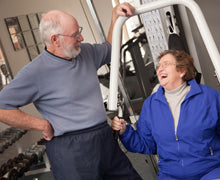
Resistance training has been shown in numerous studies to provide important benefits for long-term health but committing to two or three sessions each week can be hard for some. New research out of Finland, however, shows that seniors can profit from just one day of weight training each week.
Scientists from the University of Jyväskylä found improvements in blood values, muscle strength and even mental wellbeing with just one session a week in those in the 65-75 age range. That’s good news for seniors who are most in a position to “move it or lose it†in terms of mobility but might be intimidated by having to schedule two or three sessions each week.
"We found that individuals who were close to having high blood pressure, high cholesterol, high blood glucose, or high levels of inflammation improved the most after our nine-month training program†says Dr. Simon Walker of the Faculty of Sport and Health Sciences. “Training two or three times per week didn't provide greater benefit in these individuals."
Walker said the consensus among most national and international training supervisory bodies is two or three times per week is optimal for maximum strength development, muscle growth and fat loss. "But for other measures that are important for older people, such as the ability to perform activities of daily living, once per week seemed sufficient. Muscle strength that is needed for carrying shopping bags, walking up and down the stairs and sitting down on a toilet can be improved with strength training."
Overall wellbeing, as measured through psychological testing, was also improved in study participants over the nine months. As with the other markers, there was no difference between those who trained once a week and those who trained more often.
While the benefits were seen with just one session per week, researchers were quick to point out the seniors worked hard during that one session.
"We need to remember that these individuals trained hard, and safely, when they were with us,†Walker said, “We supervised every training session closely, making sure that they used correct technique and also ensured that they always tried to improve their training loads compared with previous training sessions."
Researchers were happy to see many study participants continued training on their own after the nine-month program ended.



